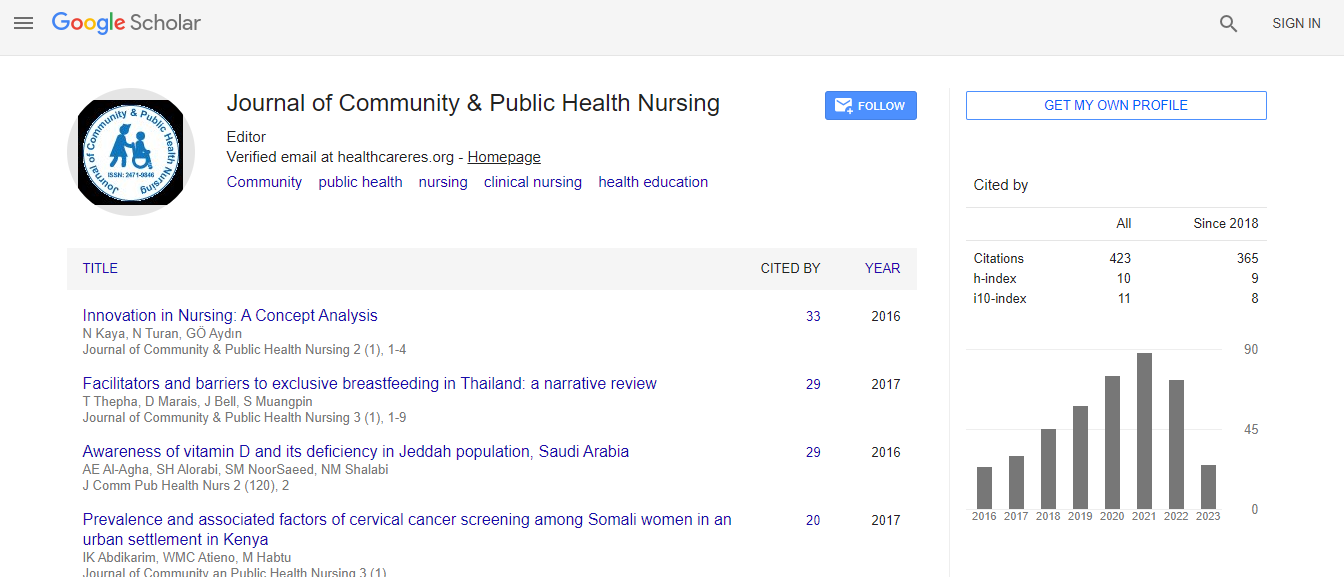Research Article
Mentoring Characteristics in Competent Clinical Educators who provide new Midwives with Instructions in Delivery Assistance
Yuri Hishinuma1*, Shigeko Horiuchi2 and Haruo Yanai2
1Tokyo Healthcare University, Japan
2St Luke’s International University, Japan
- *Corresponding Author:
- Yuri Hishinuma
Tokyo Healthcare University
4-1-17 Higashi-Gotanda Shinagawa-ku
Tokyo Japan -141-8648
Tel: +81-3-5421-7655
Fax: +81-3-5421-3133
E-mail: y-hishinuma@thcu.ac.jp
Received date: September 30, 2015; Accepted date: October 28, 2015; Published date: November 04, 2015
Citation: Hishinuma Y, Horiuchi S, Yanai H (2015) Mentoring Characteristics in Competent Clinical Educators who provide new Midwives with Instructions in Delivery Assistance. J Comm Pub Health Nursing 1:103. doi:10.4172/2471-9846.1000103
Copyright: © 2015 Hishinuma Y, et al. This is an open-access article distributed under the terms of the Creative Commons Attribution License, which permits unrestricted use, distribution, and reproduction in any medium, provided the original author and source are credited.
Abstract
Background: There are certainly clinical midwives that contribute greatly to the education of new midwives. However, inexperienced midwifery educators have difficulties with education, especially with instructing delivery assistance.
Objectives: This study reported the secondary outcome of the authors’ previous study. The purpose of this study was to explore the mentoring characteristics in competent clinical educators who provide new midwives with instructions in delivery assistance.
Method: Questionnaires were distributed to 694 midwives who had previously conducted educational activities with new midwives at the 63 facilities whose administrator or nurse manager in charge of all staff consented to participate. Of the 694 midwives, 464 (66.9%) returned the questionnaire and 317 (45.7%) valid responses were analyzed. Midwives were classified into the following three groups; Novice, Beginner and Competent, comparing the scores of the three concepts, nine sub-concepts, each of the 41 MCCM items and total MCCM of the midwives’ responses.
Results: The results showed that scores in all domains increased from Novice to Beginner and to Competent. In terms of MCCM score, Competent showed a significantly higher score than that of Novice (Competent: 157.8 ± 21.3; Novice: 141.6 ± 19.5, p<0.01), while there were no significant differences between the scores of Beginner and Competent. As for the concept of “Competency as a professional”, Competent showed significantly higher scores than Novice in every item, but showed significantly higher scores than Beginner in only one item relating to midwifery diagnoses. As for the concept of “Competency as an Educator”, Competent showed significantly higher scores than Novice in all items except items relating to thoughtfulness and empathy for the new midwives. As for the concept of “Personal characteristics”, there were five items that showed no significant differences between Competent and Novice and Beginner.
Conclusion: From this study, mentoring characteristics found in “Competent” midwifery educators were concretely revealed.

 Spanish
Spanish  Chinese
Chinese  Russian
Russian  German
German  French
French  Japanese
Japanese  Portuguese
Portuguese  Hindi
Hindi 
